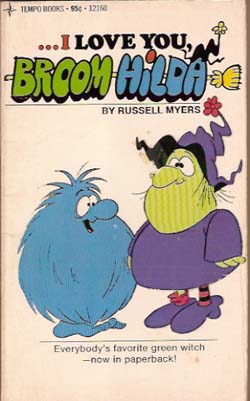
By Russell Myers (Tempo Books/Grossett & Dunlap)
ISBN 0-448-12160-3
Broom-Hilda launched on 19th April 1970, the conception of comic strip veteran Elliot Caplin (1913-2000: writer and/or creator of The Heart of Juliet Jones, Little Orphan Annie, Big Ben Bolt, Long Sam and Abbie and Slats plus a host of other classic strips–and the brother of Al Capp). He passed it on to 32 year old Russell Myers to write and draw, choosing to remain in the background as agent and business manager.
Myers, who’d previously worked as a Hallmark Card artist whilst trying to break in to the strip biz, hit the ground running and the zany antics of the old girl soon garnered lots of fans through the Chicago Tribune Syndicate’s many client papers.
Like all popular strips Broom-Hilda dances on that line dividing homogeneity and uniqueness. A successful strip concept has to appeal to a vast audience – not all of them rocket scientists – but be strong enough to provide lots of gags and still be perceived as a stand-out property. The brief, terse and decidedly surreal adventures of a homely, sharp-tongued witch and her peculiar supporting cast (which in this book from the third year of publication includes Irwin the Troll, Gaylord Buzzard, and the enigmatic and professionally abusive Grelber) proved exactly what the 1970s public wanted.
Claiming to be 1500 years old and Attilla the Hun’s ex-wife, Broom-Hilda’s cleaned up a little over the years. She is no longer a booze-swilling, stogie-smoking harridan, and she’s a little lonely. She’s still looking for a second husband…
Broom Hilda has had a few brushes with fame. In 1971 she had her own segment on the Filmation animated series Archie’s TV Funnies and in 1978 she was part of the line-up for The Fabulous Funnies – another Filmation vehicle which starred her alongside strip stars Alley Oop, Tumbleweeds, and Nancy. There’s even talk of a stage musical…
Russell Myers was awarded the Best Humour strip Award in 1975 by the American National Cartoonist Society and the strip is still going strong today. If you can track down any of the collections from the 1970s and early 1980s the stylish, loose yet meticulous line-work of Myers lends an abstract weight and intensity to the panels that got gradually left behind as papers forced strips into smaller and smaller boxes, although the pointed and deprecating humour remains a constant for this splendid feature.
© 1973 The Chicago Tribune. All Rights Reserved.
